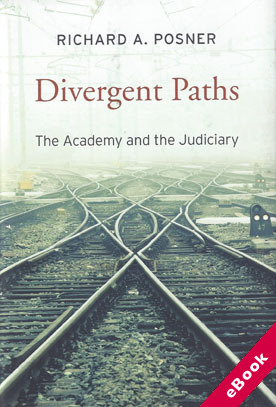
The device(s) you use to access the eBook content must be authorized with an Adobe ID before you download the product otherwise it will fail to register correctly.
For further information see https://www.wildy.com/ebook-formats
Once the order is confirmed an automated e-mail will be sent to you to allow you to download the eBook.
All eBooks are supplied firm sale and cannot be returned. If you believe there is a fault with your eBook then contact us on ebooks@wildy.com and we will help in resolving the issue. This does not affect your statutory rights.
Judges and legal scholars talk past one another, if they have any conversation at all. Academics couch their criticisms of judicial decisions in theoretical terms, which leads many judges—at the risk of intellectual stagnation—to dismiss most academic discourse as opaque and divorced from reality.
In Divergent Paths, Richard Posner turns his attention to this widening gap within the legal profession, reflecting on its causes and consequences and asking what can be done to close or at least narrow it.
The shortcomings of academic legal analysis are real, but they cannot disguise the fact that the modern judiciary has several serious deficiencies that academic research and teaching could help to solve or alleviate.
In U.S. federal courts, which is the focus of Posner’s analysis of the judicial path, judges confront ever more difficult cases, many involving complex and arcane scientific and technological distinctions, yet continue to be wedded to legal traditions sometimes centuries old. Posner asks how legal education can be made less theory-driven and more compatible with the present and future demands of judging and lawyering.
Law schools, he points out, have great potential to promote much-needed improvements in the judiciary, but doing so will require significant changes in curriculum, hiring policy, and methods of educating future judges. If law schools start to focus more on practical problems facing the American legal system rather than on debating its theoretical failures, the gulf separating the academy and the judiciary will narrow.